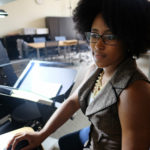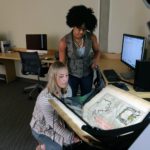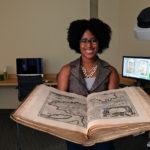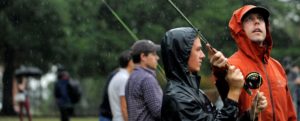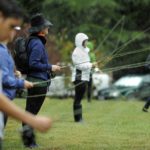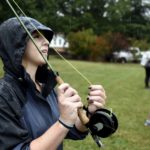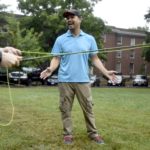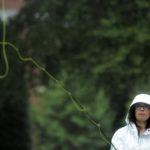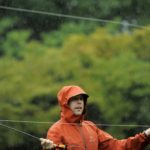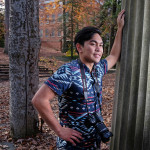With ballot and pencil in hand, you walk over to a covered voting booth. Looking down, you see a line of empty white bubbles next to names you’ve heard on the news for more than a year. But do you really know what the names stand for? Are you ready to vote?
On Tuesday, Nov. 8, more than 4,300 University of Mary Washington students will be eligible to vote for the first time. In preparation, UMW political experts Stephen Farnsworth, professor of political science, and Rosalyn Cooperman, associate professor of political science, weighed in on the 2016 U.S. Presidential election to answer questions from our own UMW community.
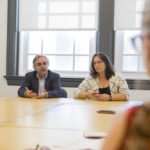
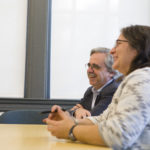

If I vote third party am I voting for Donald Trump or Hillary Clinton?
Cooperman: If depends on which state you’re voting in. If you’re voting in the Commonwealth of Virginia, I don’t know that a third party vote would affect the outcome given the polls that I’ve seen. In terms of Clinton having a comfortable enough lead in registered voters in the Commonwealth, it would be a vote for Trump. But would it affect the outcome of this state contest? Probably not.
Farnsworth: The main thing is that people have very different political environments and very different states. When you look at Virginia, the polls show an advantage for Hillary Clinton. So the consequences, in my view, are that the gap does seem large enough that more or less people can do as they please without affecting the outcome very much. If we were having this conversation about voters in Florida or North Carolina or Iowa, then we’d be looking at a state that’s a lot closer than Virginia looks to be right now, and that would suggest the wisdom of being very careful about the outcome. What often happens when you vote third party in a close election is the candidate you personally least like ends up benefiting.
Does it seem likely that Virginia will vote Democratic for three presidential elections in a row?
Farnsworth: Having Tim Kaine on the ticket as a vice presidential nominee is going to add a few points to the Democratic total in Virginia. If Kaine were not on the ticket, Hillary Clinton might be in more of a competitive race in this state. That being said, assuming that Tim Kaine is on the ticket four years from now, there would still be a couple-point bump for the Democrats in that situation. But it’s important to remember that Virginia’s purple-state status hasn’t gone away even with Tim Kaine on the ticket. The average right now for Virginia is about a four-point advantage for Hillary Clinton so it’s still more or less purple, it’s just not as purple as say Florida or North Carolina or Ohio might be right now.
Donald Trump has implied that he may not accept the results of the election. Is a candidate’s concession statement a legal requirement or just a political tradition?
Cooperman: Is a candidate’s concession speech a formal requirement? No. But I think what candidates understand, at least candidates prior to this election cycle have understood, is that there is something to be celebrated if not encouraged by the democratic transition. Winners and losers alike accept the outcome and the system resets for the next election. There is an expectation of being able to potentially look at how the vote count preceded, but that’s a very different tone from the outright and disturbing notion of refusing to accept the election outcome unless one wins.
Farnsworth: Donald Trump talking about the illegitimacy of this process before it even takes place has increased the likelihood that people will be very upset on Election Day. It may not be very pleasant for those people waiting to vote or having to face questions about whether they’re legitimate voters. I think that what Donald Trump has done is deeply troubling and really undermines the way Democrats and Republicans have been competing in elections for decades.
How can Republicans go about healing the rift within their party?
Cooperman: I recently interviewed Jennifer Pierotti Lim, a 2007 alumna of UMW, who founded Republican Women for Hillary. She spoke very candidly about the Growth and Opportunity Report that came from the Republican Party in early 2013 following their loss of the 2012 election. She was delighted that the Party recognized the need for outreach with communities of color and younger voters, and the need to be intentional in highlighting the role of women partisans in the Party. Then this campaign comes along, and she feels like her idea of what it means to be a Republican isn’t valued in the Party anymore. In fact, many of the people who find themselves in a group like Republican Women for Hillary have come out and said, “I’m a Republican, but this is a bridge too far for me in terms of supporting Donald Trump.” There is and should be a concern about how easily and whether or not those folks will come back into the party fold. The Republican Party is not a viable party without women.
Farnsworth: I think the key question is how much of a margin there is on Election Day. The scenario for the Republican Party is going to be a very painful one if it’s close. If the Republican Party doesn’t lose by much, the party’s identity crisis continues for another four years because they’ll continue down the same track. If the Republican Party gets blown out, they might make a more definitive turn.
Enthusiasm about the election peaked in March, when Sanders was drawing wide millennial support in his bid for the Democratic nomination. It dropped some in August and again a little last month. Why should millennials be sure to vote next week?
Farnsworth: I think that you have to appreciate the fact that these one-day presidential elections have extraordinarily long-term consequences. Whether you like or don’t like one or both of these candidates, you will be governed by one of them and the decision made by this country on Election Day will affect things like the Supreme Court, our international relations and war and peace. Who knows how much the impact of a presidential election can be? It’s important to remember that the consequences downstream in terms of whatever might come across four years of a presidency can really have dramatic impacts. So even if you think that Election Day doesn’t matter, for four years you’ll learn that it does.
Cooperman: This enthusiasm gap will have an impact on the candidates who run. Political science research tells us that younger people are not reliable voters and most are very turned off by the prospect of running for office. That’s a problem for this election and ones in the future. Democracies work best when people opt in – to vote and be invested enough in the system to want to participate in a meaningful way. If millennials sit out this election, they’ve given away their voice and an opportunity to have their say about how we order our priorities and spend finite resources.
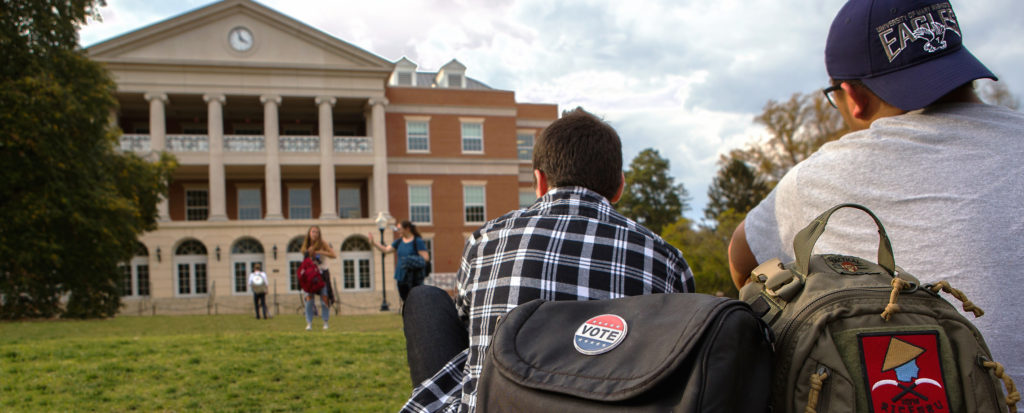
Rosalyn Cooperman, associate professor of political science, specializes in American political parties and the U.S. Congress. Her articles have been featured in multiple publications such as, American Political Science Review (2010), Virginia Social Science Journal (2011), and Political Science Quarterly (2015). She is a regular contributor to Presidential Gender Watch. Before coming to the University of Mary Washington in 2003, Cooperman’s professional experience in the political arena included serving as a campaign manager for Congresswoman Jill Long (IN-4) and working in the Montana State Legislature. Currently, she teaches the FSEM “U.S. Campaigns and Elections,” in which her students deconstruct the 2012 presidential campaign to analyze the current 2016 campaign.
Stephen Farnsworth is professor of political science and director of the Center for Leadership and Media Studies at the University of Mary Washington. He is the author and co-author of five books and dozens of scholarly articles on the presidency, mass media and Virginia politics. His political commentary has appeared in many media outlets such as The New York Times, Washington Post and C-SPAN. Farnsworth is a former Canada-U.S. Fulbright Research Chair in Public Policy at McGill University in Montreal and a former chair of the political communication section of the American Political Science Association.
